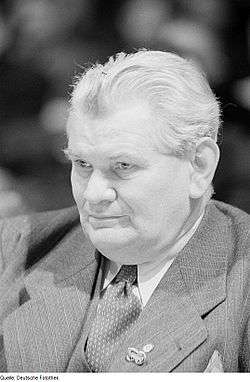Max Seydewitz
Max Seydewitz (December 19, 1892 – February 8, 1987) was a German politician (SPD, SAPD and SED). Between 1947 and 1952 he was the Minister-President of Saxony in the German Democratic Republic.[1]
Max Seydewitz | |
|---|---|
 | |
| Born | 19 December 1892 |
| Died | 8 February 1987 (aged 94) |
| Nationality | East German |
| Occupation | Printer Politician Writer |
| Political party | SPD SAPD SED |
Life
Max Seydewitz was born in a small town some 25 km (15 miles) east of Cottbus and 150 km (90 miles) south-east of Berlin. His father was a tanner. He attended school locally and undertook an apprenticeship as a book printer. He joined a socialist youth movement in 1907 and in 1910 became a member of the SPD. He served as a soldier in the war between 1914 and 1915 when he was released from the army on grounds of "unsuitability" for war. From 1918 till 1920 he worked as contributing editor on the "Volksblatt" ("People's Voice"), a socialist newspaper in Halle before moving to Zwickau where from 1920 till 1931 he served as Editor in Chief with "Saxony Volksblatt", a daily newspaper of the political left.[1]
From 1955 to 1968 Seydewitz was director of Staatliche Kunstsammlungen Dresden.
Seydewitz died in 1987 in Dresden.
Statistical comparisons
Born in Forst (Lausitz), Seydewitz was the oldest former Minister-President of Germany from November 26, 1985 to May 5, 1991 preceded by Hans Ehard and succeeded by Bruno Diekmann. If one only counts the Ministers-President of the GDR he was oldest from August 1981 to October 8, 1991; preceded by Karl Steinhoff and succeeded by Werner Bruschke.
Publications
- Die Krise des Kapitalismus und die Aufgabe der Arbeiterklasse. Verlag der Marxistischen Büchergemeinde, Berlin 1931
- Todesstrahlen und andere neue Kriegswaffen, mit Kurt Doberer. Malik-Verlag, London 1936
- Stalin oder Trotzki? - Die UdSSR und der Trotzkismus. Eine zeitgeschichtliche Untersuchung. Malik-Verlag, London 1938.
- Hakenkreuz über Europa? Vannier, Paris 1939
- Civil life in wartime Germany. The story of the home front. New York 1945.
- Es geht um Deutschland. Sachsen-Verlag, Dresden 1949. (gesammelte Rundfunkkommentare 1946–1947).
- Der Antisemitismus in der Bundesrepublik. Mit Ruth Seydewitz, Hrsg. Ausschuß für deutsche Einheit, Berlin 1956
- Das Dresdener Galerie Buch : 400 Jahre Dresdener Gemäldegalerie , mit Ruth Seydewitz, Verlag der Kunst, Dresden 1957
- Deutschland zwischen Oder und Rhein : Ein Beitr. zur neuesten dt. Geschichte. Kongress-Verlag, Berlin 1958
- Zerstörung und Wiederaufbau von Dresden Berlin (Ost) 1955. (ab 3. Auflage: Die unbesiegbare Stadt)
- Die Dresdener Kunstschätze : Zur Geschichte d. Grünen Gewölbes u.d. anderen Dresdener Kunstsammlungen, mit Ruth Seydewitz, VEB Verlag der Kunst, Dresden 1960
- Ruth und Max Seydewitz, Die Dame mit dem Hermelin: Der grösste Kunstraub aller Zeiten. Henschelverlag, Berlin (Ost) 1963
- Es hat sich gelohnt zu leben. Lebenserinnerungen eines alten Arbeiterfunktionärs. Dietz Verlag, Berlin (Ost) 1976.
- Dresden, Musen und Menschen. Ein Beitrag zur Geschichte der Stadt, ihrer Kunst und Kultur. Buchverlag Der Morgen, Berlin, 1988
External links
| Wikimedia Commons has media related to Max Seydewitz. |
- Max Seydewitz in the German National Library catalogue
References
- Michael F. Scholz. "Seydewitz, Max * 19.12.1892, † 8.2.1987 Ministerpräsident von Sachsen". Bundesstiftung zur Aufarbeitung der SED-Diktatur: Biographische Datenbanken. Retrieved 20 December 2014.
Directors of museums in Germany
